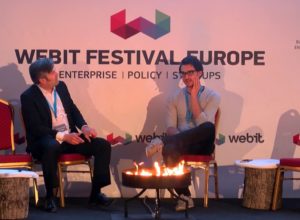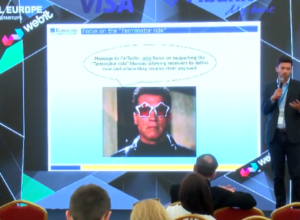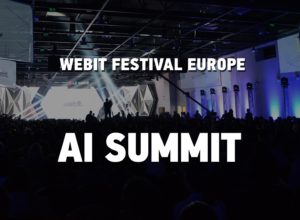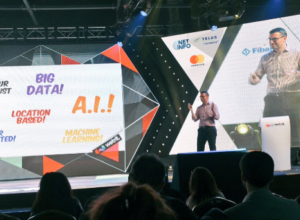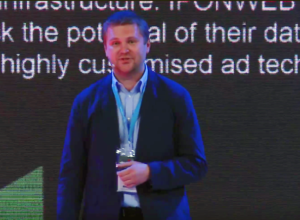Double bet: augmenting reality and Artificial Intelligence
Magic Leap, the all-mysterious company working on Augmented Reality projects since some years has released its own set of VR glasses today. It is not the first and certainly not the last company being active in the tide of enhancing the physical reality. Artificial Intelligence & Augmented Reality have become two concepts which are so modern, used and worked on these days one thinks that if anyone ever had a thought these two would pass as a vain trend for a day or two should have done their research better.
Many doors and possibilities in the future of tech development are created because of the intertwine and mutual use of these two technologies. All the new technologies and gadgets are somehow combining in this big clash that makes one wonder where all of this is going.
Augmenting reality, but also augmenting Artificial Intelligence? Now that’s a proper double
At Webit.Festival 2017 in the CEO of ARX Mark Val emphasized on the growing interest of companies in the field of Artificial Intelligence. He also made a point that the two double letter tech disruptors AI & VR are starting to intertwine around each other in a way to create bigger, more appealing and challenging opportunities. Back in the days which some have seen and lived in, games were played with joysticks on consoles attached to an old fashioned TV box. Thinking of the evolution of passing from rough barely moving images through 2D graphics and the birth of Playstation all the way to Virtual Reality games and controlling with simply using gaze and gestures seems somehow natural yet bringing more questions about what direction shall technology development take. The mixture of AI and VR is speeding up and AI will for the first time be able to take people as assets of computing. It can learn from our movements and surroundings, thus suggesting improvement and augmentation to what we’re looking at, walking through or even while calmly sitting on the couch. Interactive applications adding experience to museums’ paintings, books in libraries is one of the ways this technology is already used for good. Audiences finding such cultural experiences a bit dull are engaged in a fun and creative way and hopefully, brought into further interest in such old fashioned ways to spend some free time on. More or less, for good or bad, people are becoming more and more connected with their mobile devices and virtual possibilities, addicting as they are. Why not make a good use of all the tech boom for a profitable not only in a material, but a cultural context as well?Language learning apps
Markus Witte, one of the founders of babbel.com, a friendly-user language app, that has made learning a new language fun. At Webit.Festival Europe 2017 Markus talked about disrupting a market, cleared the term disruption and made an overview of his product - the learning app.
Below you can find the main ideas Markus shared before 500 people at the Education Summit @Webit 2017.
What does it really mean to be disruptive?
Everybody seems to be talking about it. The notion of disruption is very fussy these days. Disruption is really about industries, about markets. For the past year only Business wire has more than 2,000 disruptive companies, that’s more than 8 per day.That is scary!
The problem with this is that companies, industries usually don’t have needs or urges. People do. Just think about it, it is people who want to learn a language and language learning is a real problem. Markus compares that problem with language learning and its solution as the need for a person to listen to music and going to a live concert. Digital technology is the solution for this problem - for removing barriers to do something whenever, wherever you want to. The old methodologies are good, they do work and teachers are still an important element when it comes to teaching but you can’t have it at your disposal all the time. What proved to be harder than anyone thought, they started it, and they created solution. None of the babbel.com founders was a language teacher, or had specific knowledge on teaching, so they started disrupting from users perspective. After all, they were users, too, right. As Markus’s speech goes on, it becomes clear that the initial idea is not about disruption, not about the market, rather than the fact people actually managed to make a conversation in just several lessons. All this through games. But this is not a game. Games are inspiring when it comes to creativity and solutions, but one thing games have is they are self referential and as much as the fantasy of learning just being a game. We usually want other references, as well, we want to make a sensible conversation outside the game.In conclusion, аll this talk on disruption is somehow pointless.
Why disrupt a market, when all companies, tech people, ever do is solve problems. A user has a problem - the tech person creates the solution and that’s it. The market, the money, the profit comes next, they do. Let’s talk about solutions more than we talk about disruption. Stay tuned with the latest innovations by booking a ticket to Webit.festival Europe 2018Privacy, Security and Internet of This, That & Tomorrow
Travis LeBlanc, former Chief of Enforcement Bureau at the Federal Communications Commission
Free Internet access - a thing available at the click of a mouse or a tap on a screen for most people. But in the not so far future this wasn’t the case. An open and free Internet access still isn’t the case in a number of countries around the world. Though the UN has proclaimed Internet access as a human right.Privacy, Security and Internet of This, That & TomorrowNowadays almost all newly launched companies rely heavily on the Internet ecosystem
This trend carries numerous possibilities with it, combined with numerous unknowns too. The number of connected devices is constantly increasing. This includes not only our smartphones but any IoT devices ranging from connected vehicles through surveillance systems to our hairbrush. The IoT boom certainly provides benefits - creating smart devices, managing energy efficiency, forecasting needed repairs or whatever need it is. But at the same time carrying a number of threats with it. There have been cases as hackers obtaining personal data from institutions, taking control on connected cars and even being able to reach to a person’s pacemaker. All this serves as an example reminding us how insecure the devices we so heavily rely on are. Three years ago, the Federal Communications Commission has issued regulations to prevent broadband Internet service providers from controlling the access that consumers have to the Internet, from choosing which websites and apps we can use - basically, from choosing the winners and losers on the Internet. It has also taken measures in order to protect broadband privacy, to ensure that consumers know what particular information about them is collected from these providers, what do they do with it and to prohibit them from selling the consumers’ information without their consent.Recently though, these regulations have been reversed
Service providers are able to sell consumers’ information such as browsing history, apps downloaded, location, etc. to the highest bidder, be it the government, marketers or certain bad actors. That is enough scary of a concept by itself, having in mind how much information is contained in the smart devices we use daily. Governments and regulators should proceed from the point that everything can be hacked. At some point, it’s very likely to happen and prompt measures need to be taken to prevent or at least minimize the harm. This concerns all companies creating products and services for the market. Security and privacy issues need to be considered from the start of developing a certain product. They should not be left for figuring out after the process has finished and the damage has already been done. If you want to stay tuned with evolving security & privacy matters, the Webit.Festival 2018 in Sofia gathers some of the world’s pioneers on the subject.M&A as a Fuel to Innovation
Sriram Prakash, the Global Lead for Innovation M&A and Venturing Services at Deloitte was one of the speakers at Webit.Festival Investments Summit who shared his insight about fueling growth through innovation M&A.
Living in an economy of expectations
An innovation can come from anywhere.It can come from a small unknown town in India, it can come from a booming city like New York, it can come from anywhere. If you want to turn your innovation into a billion dollar business though, you need some extra things than the idea itself. You need an ecosystem, you need entrepreneurs and corporates, you need the governments and different policy makers. And in fact, there are very few cities and ecosystems allowing you to do that but this doesn’t mean that your ideas can’t travel. Ideas have no boundaries anymore and that’s become quite an advantage for all market players. Markets are full of uncertainty today, they are getting saturated and there’s a backlash against globalization. For the past three years revenue growth rates has been on the decline but the share price are on the rise. That’s why innovation has become such a strong priority for companies to grow. Mergers & acquisitions is one of the ways for companies to tap into innovations happening outside of their private ecosystem rather than trying to focus on purely growing organically.More and more non-technological companies are investing in and acquiring tech companies
This means that a nowadays startup has the option of not just one but more exits and more than one sectors that could be interested in its particular innovation. The process is not one-way only. It’s not only old companies trying to go into digital. Startup companies are also buying some old style companies depending on their needs. Most of the disruptors under the scope of corporates are AI, Robotics, Big Data, Analytics and IoT, finally coming to a stage where the commercial potential can be realised. Venture capital & investment companies trying to get their way through the field should be better in the way of trying to find what people want rather than trying to invent the next Facebook or Uber. The biggest battle is for the future of consumers and the consumer industry as changing as it is. Companies of different sectors are merging and acquiring others out of their area of business and specialization. We see healthcare industry mixing with Fintech, IoT with Data and all together. For the first time there’s a genuine convergence between non-traditional sectors converging around a particular opportunity.New Paradigms in Mobility
When we think for a minute about mobility and transportation, it is a thing so ordinary and habitual to our lives that we don’t even realize how essential it is.
If we think about what our lives would have been without access to mobility and transportation, to say we’ll have quite a challenging day wouldn’t be enough to portray what a day without these facilities would look like. Even more, to the present-day, so accommodated to technology generation.
The Managing Partner at New Mobility Consulting Alexander Renz presented his vision on the future of mobility at Webit.Festival 2017 in Sofia. One of the trends in mobility is connected vehicles. Vehicles become connected, these connected vehicles become part of the Internet of Things, which implies quite a lot of security risks, but also opportunities to deliver new services to the vehicle and customers. Another trend is autonomy, the role of AI self-driving cars, drones, and who knows where it’ll end. A future of cars driving around looking for passengers to pick up or to deliver goods from town to town is not unimaginable at all.
Thanks to Elon Musk we’re on the way to accomplish zero emission mobility, enabled by electric cars and infrastructure. It doesn’t only concern about creating the vehicle but a complete system with energy generation, electric charging infrastructure and the vehicles adapted to the new system.
The major problems in cities - parking, deliveries, ticketing, faster and better transportation and infrastructure are all on the table of resolving. The key thing is, that this is no longer a world where technology plays a role in making things better but it’s a complete technology driven transformation of a critical sector.
This transformation of mobility will impact a lot of different industries.
The model of owning a car has been already challenged since the birth of Uber, Lyft and other examples of the sharing economy. Once we're ready and sit in our self driving vehicles, the monetization model of the future would be very different from today - the use of Internet services, the type of content we'll consume in in our added spare time while we don't have to drive. Mobility and transportation is an industry being heavily disrupted and has yet to be disrupted, still.Trends in cross-border payments
[embed]https://www.youtube.com/watch?v=OsBtydb2Pqc&t[/embed]
2017 Webit stage saw the cooperation of two people - the one with years of experience in the sphere of fintech - Michel Stuijt, the CEO of Eurogiro, and the great, innovative mind Or Benoz, co-founder of Rewire. They both investigated the trends in cross-border payments.
In his experience, Michel opens the discussion, he outlined a four expectations of what people see in the future of payments:
-
Free
-
Fast, if not instant
-
Secure
-
Full withdrawal
The main trend, the future in financial technology, lies in the cooperation.
The duo on the stage is quite a good example - the financial institution Eurogiro and the innovative products Rewire create is a great example in cross border cooperation. In 20 years time the only solution for regulation of the blockchain, fintech, trading, transactions, etc, is the good cooperation between all stakeholders. Because, let’s face it - there are few companies that create new technologies in the world today. In 5 - 10 years from now, we will see many technology companies focusing on consumer experience, making the experience amazing; on the opposite side, the financial institutions, organizations, etc, already have financial instruments, licenses and the infrastructure. The future of cross border payments lies in the cooperation between both ways.Humanistic Trans-humanism
“Some technology solutions may not only erase physical or mental deficits but leave patients better off than ‘able-bodied’ folks. The person who has a dis-ability today may have a super-ability tomorrow.”
Stephen HawkingWhat are the “assistive technologies”?
check the upcoming 👉 Webit.Festival 2018
Simply put, this is a technology that is used to increase, maintain, or improve the functional capabilities of people with disabilities. To give you a quick glimpse into understanding, the name Stephen Hawking would help. Hawking has experimented with numerous technologies of this kind. He has communicated using a spelling card, indicating letters and forming words with a lift of his eyebrows. Then, with the help of a computer program allowing him to select words and commands using a hand clicker linked to a speech synthesizer, he has obtained a voice. By moving a single muscle on his cheek and selecting characters from a software screen keyboard, he is able to deliver his thoughts. Normally, one would say that such technology is good for people with disabilities. That way they can:- continue learning or
- be able to maintain a profession.
Technology has played an immense role in helping scientists invent different devices in order to help people with disabilities.
There are hearing devices already put in use, eye tracking and brain controlled interfaces that help to communicate with a computer. Developments towards making artificial retinal implant that can restore lost vision, cars for blind people, exoskeletons assisting people with movement difficulties, enhanced learning for people with learning disabilities that measures and stimulates the brain’s activity. And the big top: brain computer interfaces - a direct communication pathway between an enhanced or wired brain and an external device. The use and progress of Artificial Intelligence is a big stake in improving people’s lives but the thing is that these technologies are being constantly developed and people have benefited from this but these same people are not so many at all 60% of the people are afraid of the progress in AI and robotics. How much will they develop? Will the scenarios from almost all Hollywood movies on the theme shift to reality? We will just have to wait till 2045 and see if Ray Kurzweil’s prediction about the Singularity Point will turn up to be true and whether AI will be developed to such an extent that we’ll be able to merge with it. Watch the full keynote of Maurice Grinberg, Director of HiLab for getting a wider perspective on what AI is here: [embed]https://www.youtube.com/watch?v=ZYPrwZqE9vo[/embed]Intangible assets – blockchain relation
Do your friends ever talk about blockchain, fintech, transactions, etc.. and you just sit there not knowing what to say? Alexander Shulgin is here to bring some light and educate us on these terms.
Bitcoin, he explains, is not a currency, although we use it like that. It is in fact a decentralized distribution data based technology based on trust, used for transactions, agreements, etc.
 The infographic shows the starts of tomorrow and they are based on patent IP and full copyright.
A case study that Alexander presents can be seen here:
[embed]https://www.youtube.com/watch?v=ZScSjPjPEqg[/embed]
Keep up with Webit.Festival 2018 agenda with a series of startup events such as the Founders Games, Startups & Investors Summit, nurturing the connection between these two intertwined parties. And more.
The infographic shows the starts of tomorrow and they are based on patent IP and full copyright.
A case study that Alexander presents can be seen here:
[embed]https://www.youtube.com/watch?v=ZScSjPjPEqg[/embed]
Keep up with Webit.Festival 2018 agenda with a series of startup events such as the Founders Games, Startups & Investors Summit, nurturing the connection between these two intertwined parties. And more.
Do you believe that blockchain affects only banks and banking institutions? Well, you are wrong.
The first companies to use this technology were not banks, nor are the ones that use it today - companies like Apple, Alphabet, Microsoft, Exxon Mobile. It will disrupt firstly intellectual property, for example, as well as other intangible assets. Nowadays, a priority of all the businesses is to establish a global database for intangible assets. Without them, businesses cannot do any IoT, anything that is based on blockchain. It became clear that blockchain and Intangible assets go hand in hand, but they also create a platform for- knowledge economy and
- creative economy
 The infographic shows the starts of tomorrow and they are based on patent IP and full copyright.
A case study that Alexander presents can be seen here:
[embed]https://www.youtube.com/watch?v=ZScSjPjPEqg[/embed]
Keep up with Webit.Festival 2018 agenda with a series of startup events such as the Founders Games, Startups & Investors Summit, nurturing the connection between these two intertwined parties. And more.
The infographic shows the starts of tomorrow and they are based on patent IP and full copyright.
A case study that Alexander presents can be seen here:
[embed]https://www.youtube.com/watch?v=ZScSjPjPEqg[/embed]
Keep up with Webit.Festival 2018 agenda with a series of startup events such as the Founders Games, Startups & Investors Summit, nurturing the connection between these two intertwined parties. And more. It’s evolution, baby!
Starting by examining the opinion of Webit’s Blue Stage audience on their belief in evolution or if God made it all, Michael Schuster, partner at Speedinvest, managed to deliver a pretty helpful and interestingly funny presentation on the topic of the two main intertwined disruptors in business: startups and investors.
Tides turn and seasons change, yesterday’s predator becomes today’s prey. Why are some companies around for tens or a hundred of years already, be it Siemens, IBM, and whatever company acknowledged by everyone as a steady rock in business, while others don’t survive the light of the next day?
Schuster presented the ideal graph of a startup funding escalation:
А startup is launched with friends, family, getting private and angels’ investments, then going through series of rounds and going up and up until the one point IPO. It would’ve been nice if every startup story goes this way, but most of the times it doesn’t happen as ideal as this. Startups “start”, get whatever help possible, moving from getting seed investments to almost disappearing, going up and down until the moment of breaking through the market or collapsing and disappearing. For a startup, what is essential before the run for scaling, acquisitions and becoming unicorns, is that: you just need to survive. And in order to survive in the world and not become an extinct dinosaur, the law of evolution applies pretty much for startups too: it is not the strongest of the species that survive, nor the most intelligent, but the one most responsive to change. Both statistics and reality show well enough the differences between the european and US markets. The business models applied in the latter don’t always work that well in the european market which is not always taken in enough consideration. Funny enough, investment companies, as an industry that is actually funding disruption hasn’t been disrupted itself in a long while. A lot of things need to be considered by startups while trying to get the attention of investors and customers. Big, trendy words like AI, customer centric, big data and so on are constantly thrown at the funding companies; startups are chasing investors not quite suited for them and accelerators way before the time for this has come while missing some important points.If you are interested in learning what they are, check the full video of Schuster’s presentation at last year’s Webit here: [embed]https://www.youtube.com/watch?v=KZRUcoHxn-c[/embed] Keep up with Webit.Festival 2018 agenda with a series of startup events such as the Founders Games, Startups & Investors Summit, nurturing the connection between thesе two intertwined parties. And more.Innovation in digital data activation in programmatic
Bid enrichment is not in the future, it is happening now
The topic of bid enrichment has been a passion for the General manager Emerging technologies of Iponweb, Andrey Khemmelis for a long time. Before 1000 people Andrey presented Iponweb’s innovation in the area of data activation. Along with targeting the different features in a commercial production, historically, there has been a lot of waste. Which means your campaigns are seen by many people outside the target group, which may not be a terrible thing. But more and more marketers nowadays are trying to minimize this waste.There have been two major milestones in digital advertising:
- When advertisers got the ability to target their audience for the first time using sponsored campaigns
- When real time programmatic trading came around, which on one hand gave unlimited opportunities to marketers to target their ads better, but on the other hand it dramatically increased complexity of media operations




